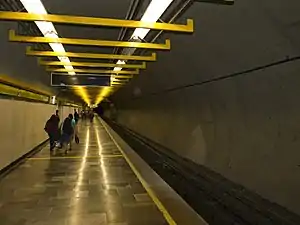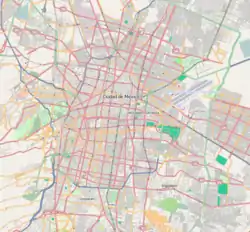| STC rapid transit | |||||||||||
 Station platforms in 2014 | |||||||||||
| General information | |||||||||||
| Location | Chimalistac, Coyoacán Mexico City Mexico | ||||||||||
| Coordinates | 19°20′47″N 99°10′52″W / 19.346395°N 99.18103°W | ||||||||||
| Line(s) | |||||||||||
| Platforms | 2 side platforms | ||||||||||
| Tracks | 2 | ||||||||||
| Construction | |||||||||||
| Structure type | Underground | ||||||||||
| Platform levels | 1 | ||||||||||
| Parking | No | ||||||||||
| Bicycle facilities | No | ||||||||||
| Accessible | Partial | ||||||||||
| History | |||||||||||
| Opened | 30 August 1983 | ||||||||||
| Passengers | |||||||||||
| 2022 | 9,017,278[1] | ||||||||||
| Rank | 24/195[1] | ||||||||||
| Services | |||||||||||
| |||||||||||
| Location | |||||||||||
 Location within Mexico City | |||||||||||
| Area map | |||||||||||
Miguel Ángel de Quevedo (also spelt M. A. de Quevedo) is a station along Line 3 of the Mexico City Metro.[2][3] It is located in Mexico City's southern Coyoacán borough, at the junction of Avenida Miguel Ángel de Quevedo and Avenida Universidad.[2]
General information
The station logo represents a tree.[2][3] Its name comes from the nearby avenue, which was named in honor of Miguel Ángel de Quevedo, an engineer who founded the nearby Viveros de Coyoacán arboretum and nursery (parts of which are a publicly accessible park and a popular area for recreation). Apparently, this station was initially designed to have a third platform between the other two, but it was never made operational, the design was changed, and today it is used by workers and for access to an electrical substation. The station serves the Colonia Chimalistac, Santa Catarina, and Romero de Terreros districts.[2] It was opened on 30 August 1983.[4]
This station transfers to trolleybus Line "K1", which runs between Ciudad Universitaria, the main campus of the Universidad Nacional Autónoma de México, and the San Lorenzo Tezonco campus of Universidad Autónoma de la Ciudad de México.[5]
It also serves as a terminal for bus lines 41 and 66 which connect the station to several locations in the Contreras area.
Ridership
| Annual passenger ridership | |||||
|---|---|---|---|---|---|
| Year | Ridership | Average daily | Rank | % change | Ref. |
| 2022 | 9,017,278 | 24,704 | 24/195 | +35.98% | [1] |
| 2021 | 6,631,245 | 18,167 | 29/195 | −11.63% | [6] |
| 2020 | 7,504,108 | 20,503 | 25/195 | −37.99% | [7] |
| 2019 | 12,101,570 | 33,154 | 33/195 | +2.84% | [8] |
| 2018 | 11,767,521 | 32,239 | 34/195 | −6.75% | [9] |
| 2017 | 12,618,896 | 34,572 | 28/195 | −1.52% | [10] |
| 2016 | 12,813,161 | 35,008 | 29/195 | +8.76% | [11] |
| 2015 | 11,781,124 | 32,277 | 38/195 | +4.78% | [12] |
| 2014 | 11,243,904 | 30,805 | 40/195 | −2.97% | [13] |
| 2013 | 11,588,296 | 31,748 | 41/195 | +10.87% | [14] |
| 2012 | 10,451,759 | 28,556 | 52/195 | −10.06% | [15] |
| 2011 | 11,620,702 | 31,837 | 42/175 | +22.26% | [16] |
| 2010 | 9,505,020 | 26,041 | 45/175 | – | [17] |
Exits
- Northeast: Avenida Universidad and Miguel Ángel de Quevedo, Romero de Terreros
- Southwest: Avenida Universidad, Chimalistac
- West: Avenida Universidad, Chimalistac
References
- 1 2 3 "Afluencia de estación por línea 2022" [Station traffic per line 2022] (in Spanish). Sistema Transporte Colectivo Metro. 2023. Archived from the original on 5 March 2023. Retrieved 5 March 2023.
- 1 2 3 4 "Miguel Ángel de Quevedo" (in Spanish). Sistema de Transporte Colectivo. Archived from the original on 8 August 2011. Retrieved 20 August 2011.
- 1 2 Archambault, Richard. "Miguel Ángel de Quevedo - Mexico City Metro System". Retrieved 20 August 2011.
- ↑ Monroy, Marco. Schwandl, Robert (ed.). "Opening Dates for Mexico City's Subway". Retrieved 14 August 2011.
- ↑ "Servicios.- Servicio de Transportes Eléctricos del D.F.: Línea: K1 LINEA K1 UNIVERSIDAD AUTÓNOMA DE LA CIUDAD DE MÉXICO - CIUDAD UNIVERSITARIA" (in Spanish). Servicio de Transportes Eléctricos. Archived from the original on 6 August 2011. Retrieved 20 August 2011.
- ↑ "Afluencia de estación por línea 2021" [Station traffic per line 2021] (in Spanish). Sistema Transporte Colectivo Metro. 2020. Archived from the original on 7 March 2022. Retrieved 7 March 2022.
- ↑ "Afluencia de estación por línea 2020" [Station traffic per line 2020] (in Spanish). Sistema Transporte Colectivo Metro. 2021. Archived from the original on 21 June 2021. Retrieved 21 June 2021.
- ↑ "Afluencia de estación por línea 2019" [Station traffic per line 2019] (in Spanish). Sistema Transporte Colectivo Metro. 2020. Archived from the original on 8 April 2020. Retrieved 3 May 2020.
- ↑ "Afluencia de estación por línea 2018" [Station traffic per line 2018] (in Spanish). Sistema Transporte Colectivo Metro. 2019. Archived from the original on 6 June 2019. Retrieved 7 April 2020.
- ↑ "Afluencia de estación por línea 2017" [Station traffic per line 2017] (in Spanish). Sistema Transporte Colectivo Metro. 2019. Archived from the original on 3 May 2020. Retrieved 3 May 2020.
- ↑ "Afluencia de estación por línea 2016" [Station traffic per line 2016] (in Spanish). Sistema Transporte Colectivo Metro. 2017. Archived from the original on 3 May 2020. Retrieved 3 May 2020.
- ↑ "Afluencia de estación por línea 2015" [Station traffic per line 2015] (in Spanish). Sistema Transporte Colectivo Metro. 2016. Archived from the original on 3 May 2020. Retrieved 6 May 2020.
- ↑ "Afluencia de estación por línea 2014" [Station traffic per line 2014] (in Spanish). Sistema Transporte Colectivo Metro. 2015. Archived from the original on 3 May 2020. Retrieved 6 May 2020.
- ↑ "Afluencia de estación por línea 2013" [Station traffic per line 2013] (in Spanish). Sistema Transporte Colectivo Metro. 2014. Archived from the original on 3 May 2020. Retrieved 6 May 2020.
- ↑ "Afluencia de estación por línea 2012" [Station traffic per line 2012] (in Spanish). Sistema Transporte Colectivo Metro. 2013. Archived from the original on 3 May 2020. Retrieved 6 May 2020.
- ↑ "Afluencia de estación por línea 2011" [Station traffic per line 2011] (in Spanish). Sistema Transporte Colectivo Metro. 2012. Archived from the original on 7 May 2020. Retrieved 6 May 2020.
- ↑ "Afluencia de estación por línea 2010" [Station traffic per line 2010] (in Spanish). Sistema Transporte Colectivo Metro. 2011. Archived from the original on 7 May 2020. Retrieved 6 May 2020.